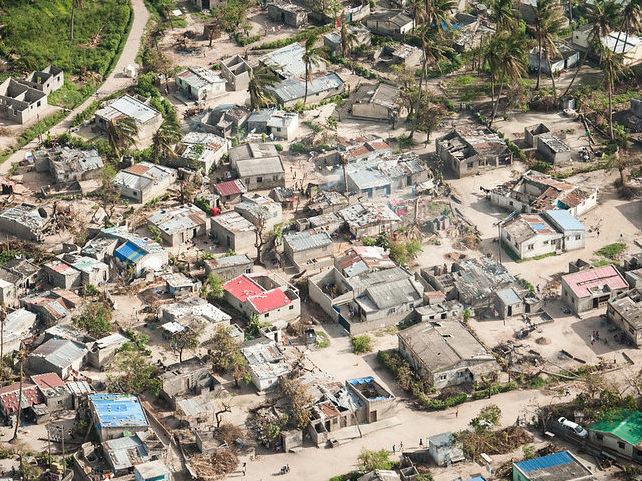Photo Credit: European Union 2019/Photographer: Christian Jepsen
Climate change is having a profound and escalating impact on health inequalities around the world. Events such as cyclones, tornadoes, and flooding are predicted to become more common and severe, along with slower-moving changes such as drought, extinction of pollinators, and temperature extremes. These not only increase the risk of economic stress and forced displacement but also reduce access to health care services. Areas impacted by natural disasters, for example, can physically disrupt roads to health facilities or damage health infrastructure. Health care workers may also be displaced or unable to work effectively due to damage to their own households. Natural disasters can also negatively impact communities financially, thus reducing their ability to pay for health care. As governments mobilize to address disasters, effective responses to climate-related disruptions in health systems have not always been a priority, but need to be.
In 2019, Columbia University’s Earth Institute funded a collaboration with ICAP at Columbia University to develop models for health systems resilience through the Solutions for Sustainability (S4S) project. Starting in Mozambique, a country with a high burden of HIV and other chronic conditions, the project focused on a post-disaster review and situational analysis of areas most impacted by the 2019 Cyclones Idai and Kenneth. These cyclones affected over 1.8 million people and severely damaged infrastructure and agriculture.
By conducting key informant interviews with governmental and non-governmental stakeholders and focus group discusisons with health facility clients, this project aimed to provide a synthesis of lessons learned and recommendations to inform future national strategies and responses. In 2020, the data collection process was impacted by the onset of the COVID-19 pandemic, highlighting the need to collect data on health system resilience for cyclones and the pandemic.
“During this time, attendance at health facilities waned across the country as many clients feared exposure to SARS-CoV-2. In addition, the Mozambican government implemented multiple measures to safeguard health care workers, including staff rotations within facilities and remote work for at-risk and vulnerable populations,” said Mirriah Vitale, MPH, ICAP’s country director in Mozambique. “To ensure participation in this important project, we initially delayed data collection and then tailored our protocol to include virtual options, such as an electronic questionnaire and phone interviews. Once we were able to conduct face-to-face interviews with key informants and focus groups at health facility level, we ensured safety measures, including social distancing, and held the interviews and focus groups outside in open spaces.”
Across all provinces of Mozambique, policymakers and responders to cyclone emergencies were also responsible for the ongoing pandemic response. Once interviews were scheduled, the timing of this project allowed for additional data collection on how COVID-19 was affecting communities prone to natural disasters.
According to the communities, after Cyclone Idai in March 2019, rain from the cyclone also destroyed roads and subsequent access to health facilities, sanitary infrastructure, medication supply, and electromedical devices. These conditions impacted both patients and health care providers in accessing facilities and the provision of care.
“Through these interviews, we found that a key area which needs to be addressed post-disaster is in ensuring basic supplies, such as food and water, clothing, and support for mental health, along with construction material for communities to re-build their lives,” said Andrea Low, MD, PhD, clinical and scientific director for ICAP’s PHIA project, and principal investigator of the study. “The availability of ambulances to transport patients from a disaster to safe zone was also identified as a critical need.”
In terms how the COVID-19 pandemic affected these areas, focus groups widely mentioned issues of unemployment and restrictions in access to schools, hospitals, and travel. Though routine services for chronic patients changed and community support services were impacted, quarterly dispensation of HIV medication and monthly dispensation of tuberculosis medication were viewed as positive shifts.
The results of the S4S study will help the government of Mozambique strengthen plans and actions to restore health services during and after disasters and better prepare for potential impacts on the health sector due to such emergencies. The final report of the S4S study will be available in the coming months.
A major global health organization that has been improving public health in countries around the world for over 15 years, ICAP works to transform the health of populations through innovation, science, and global collaboration. Based at Columbia University in New York City, where it is part of the Mailman School of Public Health, ICAP has projects in more than 30 countries, working side-by-side with ministries of health and local partners to confront some of the world’s toughest health challenges. Through meaningful research, tailored technical assistance, effective training and education programs, and rigorous surveillance to measure and evaluate the impact of public health interventions, ICAP aims to realize a global vision of healthy people, empowered communities, and thriving societies. Online at icap.columbia.edu.







